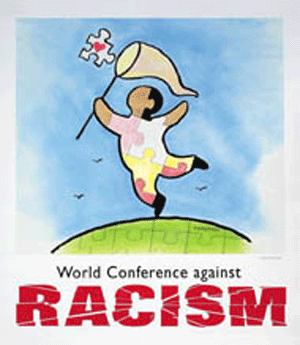The Third Decade to Combat Racism and Racial Discrimination (1994-2003) has been marked by a broadened view of the problem and the realisation that each society is affected by discrimination. The UN General Assembly urged governments to combat new forms of racism; discrimination based on culture, nationality, religion or language; and racism resulting from official doctrines of racial superiority or exclusivity.
Theme
The wcar slogan is "United to Combat Racism: Equality, Justice, Dignity". The conference aim is to ensure that international standards and instruments are applied in efforts to combat it. It could also formulate recommendations for further action to combat bias and intolerance.
The Conference’s First Preparatory Committee (PrepCom), held from 1 to 5 May 2000, in Geneva, defined the following themes as a provisional agenda of the wcar.
1. Sources, causes, forms and contemporary manifestations of racism, racial discrimination, xenophobia and related intolerance.
2. Victims of racism, racial discrimination, xenophobia and related intolerance.
3. Measures of prevention, education and protection aimed at the eradication of racism, racial discrimination, xenophobia and related intolerance, at the national, regional and international levels.
4. Provision of effective remedies, recourses, redress, compensatory and other measures, at the national, regional and international levels. (The word ‘compensatory’ is in square brackets in the text, a UN way of signaling that there is no agreement on the use of this word).
5. Strategies to achieve full and effective equality, including international cooperation and enhancement of the UN and other international mechanisms in combating racism, racial discrimination, xenophobia and related intolerance, and follow-up.
There have been two subsequent PrepComs, both to resolve difficulties over the wording of texts of the Draft Declaration and a Programme of Action to be a dopted at the Durban Conference. The WCC has been represented at each PrepCom.
WCC contribution towards the WCAR
The context
Racism has been a concern of the ecumenical movement for at least 70 years. However there has been a special focus on the issue since 1968 when the WCC Central Committee set up the Programme to Combat Racism (PCR). In 1998, during the VIIIth Assembly in Harare, The WCC celebrated the 30th anniversary of the Programme to Combat Racism.
In 1995, the Central Committee of the WCC noted that: "Institutional racism and the ideology of racism, in their most pernicious forms, continue unabated in contemporary societies and still affect churches dramatically while ongoing social, political and economic trends are producing new forms of racism."
In response to that challenge, the WCC’s work on racism aims to engage and accompany the churches to recognise, to understand and attempt to overcome racism wherever it exists in their midst. WCC continues the effort to combat racism as a central part of the churches’ life rather than something marginal. In this work, WCC tries to promote partnerships between Regional Ecumenical Organisations (such as the Christian Conference of Asia or the All Africa Conference of Churches) and national councils of churches which have programmes against racism, or which focus on racially/ethnically oppressed peoples, on Indigenous Peoples, Dalits, or women as victims of racism.
The Ecumenical Study Process on Racism
To understand and combat the old and new manifestations of racism in society and in the church, new analysis is needed. There is a need - and this is a difficult and challenging discussion - to identify oppressive, racist theologies. There is also an urgent need to understand the links, and distinctions, between racism, sexism, ethnocentrism, casteism and other "isms".
The Ecumenical Study Process on Racism, mandated by the WCC Central Committee, is a response to these needs. The Study has been carried out by the Justice, Peace and Creation (JPC) team. It will present its findings to the Central Committee, in September 2002, in a document which has been so far entitled "Understanding Racism Today". Beyond that the main objective of the study is to analyse its global and regional trends, and redefine the focus for work on racism and its specific strategies.

